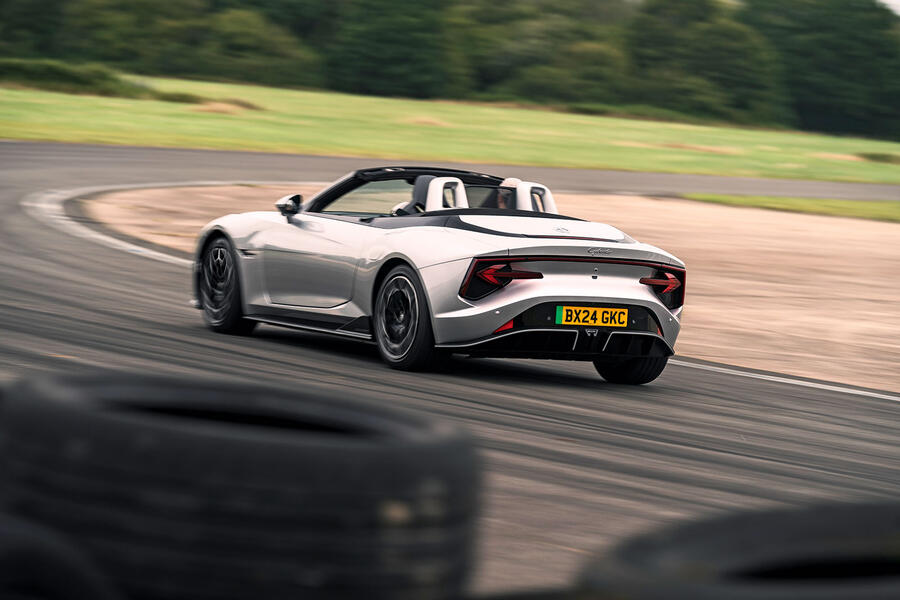The Cyberster isn’t the first electric MG sports car – if you include B-derived electromods
It’s rare to be introduced to a car as the one “we didn’t want to make”. Abingdon-based MG specialist Frontline resisted the idea of an electric restomod for a long time before customer demand reached a level that was simply too hard to resist.
Yet the resulting BEE GT feels like the culmination of a life’s vision, its aesthetic, detailing, fit and finish all being sublime and the whole thing exuding a coolness that I’ve never quite come across in a stock MGB.
This prototype links a 40kWh battery to a 120bhp electric motor for a junior hot hatch level of performance and up to 140 miles of range in favourable conditions.
Frontline now offers a slightly pricier 60kWh long-range model that hikes both the power and range figures past 200 (slicing the 0-62mph time to less than 7.0sec) and raises the charging speed from 7kW to 22kW – useful, as a full refuelling of this standard BEE GT takes around seven hours.
The core of the donor B (either roadster or coupé) remains, with new components hooked up to enough of the original structure to avoid reregistration and thus a jarring Q numberplate. It looks every inch the car that went before, right down to its Type 2 charging port tucked neatly behind the old metal filler cap.
Much of its electric equipment is stuffed where an engine once lived, but Frontline claims similar weight to its petrol projects and smarter weight distribution of 50:50 front to rear.
Around 30kg of its mass is sound-deadening to counteract the hubbub that would usually be drowned out by internal combustion.
Most curious of all is what sprouts from the middle of the car: a glistening wooden knob that links you to a five-speed manual gearbox beneath. Slot it into third and you can operate the BEE GT via two pedals and a single speed like it’s any other EV, but you would be missing the point.

The taut ceramic clutch isn’t used to pull away or come to a halt, but you do need it during gearchanges. So you select first, release the handbrake and feed in the throttle as the muscle memory in your resting left foot almost spasms.
While Frontline claims up to 9000rpm, you’re not relying on a rev counter, rather a power reserve meter. Changing up at what would traditionally be a redline isn’t always easy, but you can still rifle up and down the five ratios via your usual senses.
Your changes need to be fairly deliberate too, especially going down. It doesn’t demand a heel-and-toe blip but would prefer it, with a jerkiness to iron out if you’re willing.
And therein lies the magic of this car: there’s something to learn. All too often, the criticism of performance EVs is their feeling of one-dimensionality, how point and squirt they feel. Here there’s a challenge to go chasing.
I reckon you would want the quicker version, too. While it’s jolly nice to be in an EV that’s in no hurry to get anywhere, 120bhp just isn’t quite enough power to rouse true mischief in corners or truly test the Quaife limited-slip differential.
Still, there’s enough pitch and lean to keep you immersed and you will potter around basking in the novelty of its niche drivetrain.

Crucially, the BEE GT involves you. Alongside it, the new MG Cyberster exhibits loads more speed yet no more feel.
The interior lives up to being from another century, with its myriad screens – not to mention the number of times I try to grab a handle rather than toggle the central switches of its grandiose butterfly doors.
At the initial launch, I preferred the purity of this RWD Trophy to the outrageous performance of the 4WD GT, but it does feel a bit sanitised without the full 503bhp, 3.2sec hit available.
That said, the Cyberster proves an EV can have a sense of humour, even if its cloying safety systems often lack one. And this comparison makes its price look a giveaway.
But it’s outcharmed by the BEE GT, whose punchier powertrain option should prime it for more than a hushed Sunday pootle.
A company once bashful about electromods has made damn sure to do its own one differently.
Source: Autocar
